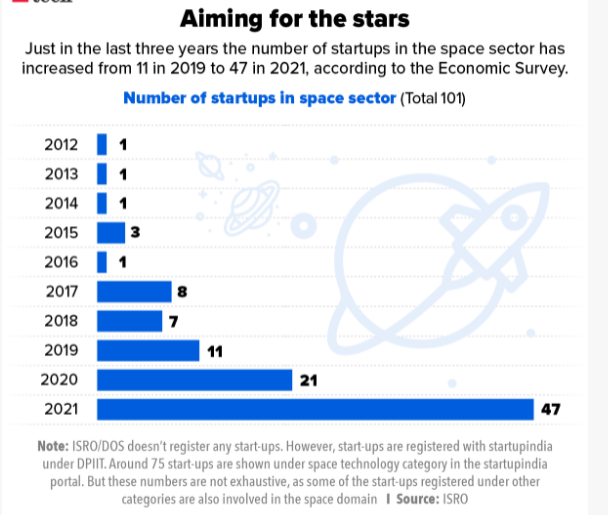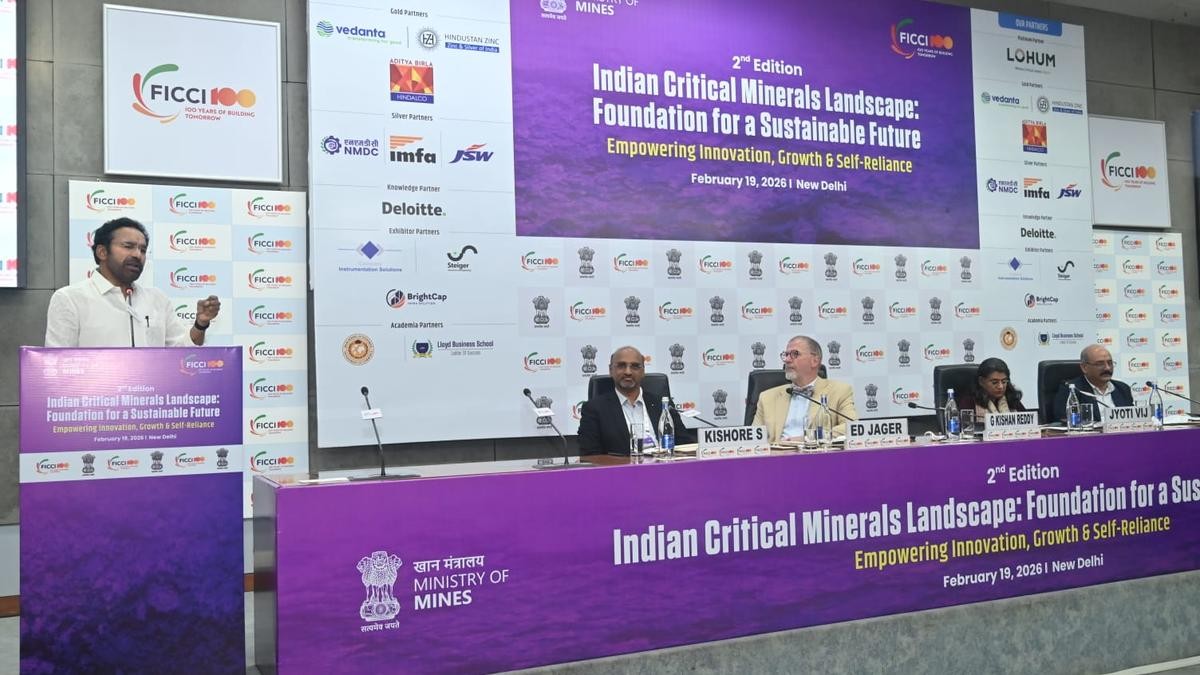Description

Disclaimer: Copyright infringement not intended.
Context
- Principal Scientific Adviser Ajay Kumar Sood stated earlier this month that the government would soon come up with a new space policy to increase private sector participation in the industry.
The Indian space sector
- The Indian space sector has been globally recognized for building cost-effective satellites, launching lunar probes and taking foreign satellites to space. The global space economy is estimated at ~US$ 423 billion. Currently, India constitutes 2-3% of the global space economy.
- From 1999 till December 2021, a total of 342 foreign satellites from 34 countries have been successfully launched on board Indian Polar satellite Launch Vehicle (PSLV) on a commercial basis.
- India is the sixth-largest player in the industry internationally having 3.6% of the world’s space-tech companies (as of 2021). U.S. holds the leader’s spot housing 56.4% of all companies in the space-tech ecosystem. Other major players include U.K. (6.5%), Canada (5.3%), China (4.7%) and Germany (4.1%).
- India’s space programme has attracted global attention for its accelerated rate of development, with a critical appreciation for the following extraordinary explorations:
- Mars Orbiter Mission (MOM) or Mangalyaan
- Chandrayaan-2 Mission(India's 2nd mission to the moon)
- AstroSat Mission (India’s 1st observatory mission for astronomy)
- Aditya-L1 Mission (India’s 1st solar observatory in space)
- ISRO has forged a strong relationship with many industrial enterprises, both in the public and private sector, to implement its space projects.
- With the ISRO undertaking the development of cutting-edge technologies and interplanetary exploratory missions, there is a tremendous scope in contributions to the realization of operational missions and new areas such as satellite navigation.
Key reforms in the Indian space sector
Promoting and enabling private enterprises to carry out independent space activities:
- In 2020, the Government in a historical decision, approved participation of private enterprises across all phases of space activities.
- The government also approved formation of the Indian National Space Promotion and Authorisation Centre (IN-SPACe)—that would act as part of the Indian Space Research Organisation (ISRO)—to help private players become independent actors instead of being solely vendors or suppliers.

Increasing participation of private enterprises in the Indian space sector:
- Many Indian private companies and start-ups have been showing interest in space activities and services, as various government initiatives have been announced.
- As of 2021, India has 368 private space firms, making it fifth in the world after the US, the UK, Canada and Germany.
- With 368 private space firms, India is leading China (288), France (269), and Spain (206).
- The number of private company proposals in the space sector has increased by 30% in 2021 from 22 proposals in 2020- ISRO.
- In just three years, the number of startups in the space sector increased to 47 in 2021 from 11 in 2019, an indicator of the pace of growth in the space sector in India.

Inspiring young entrepreneurs and students:
- To boost participation of young people and students in the Indian space sector, NITI Aayog, in collaboration with ISRO and the Central Board of Secondary Education (CBSE), launched the Atal Tinkering Lab (ATL) space challenge as part of the Atal Innovation Mission in 2021.
- The GOI has been developing world-class learning facilities and space museums, where students can learn the basics of space technology, develop interests, and pursue careers in Science, Technology, Engineering and Mathematics (STEM). STEM is a relatively new term in the Indian education industry and helps develop critical thinking and problem-solving abilities among students.
Revising the Foreign Direct Investment (FDI) policy to open investment opportunities for foreign companies:
- Foreign Direct Investment (FDI) up to 100% is allowed in satellites-establishment and operation, subject to the sectoral guidelines of the Department of Space/ISRO, under the government route.
- With IN-SPACe, the government can establish a link between ISRO and private sector companies to utilize Indian space resources and increase space-based activities. Currently, all FDI investments must be cleared by the government, but the industry wants investments to be cleared through the automatic route.
Establishment of the Indian Space Association (ISpA):
- In 2021, GOI, launched the ISpA. This association will help private players carry out independent space activities, facilitate services and technology developed by ISRO to be utilized in the private sector, provide regulatory and policy inputs and support start-ups, MSMEs and academia.
- ISpA will support the government’s vision of ‘Atmanirbhar India’ (self-reliant India) and ‘Make in India’ to become a leader in the global space industry.
- It would act as a single-window agency and open the Indian space sector to private enterprises and start-ups.
Encouraging the public sector to focus on research & development activities:
- As IN-SPACe will govern participation of private players in the Indian space sector, ISRO will focus more on research & development, technology innovation, space exploration and human spaceflight.
Transferring technologies developed by ISRO to industries for commercialisation:
- A memorandum of understanding (MoU) was signed between the Department of Space (DoS) and NewSpace India Limited (NSIL) in 2020.
- This MoU will help the NSIL identify technologies developed by ISRO (that have the potential for commercialization) and transfer it to external entities in the public & private sectors, academia and state & central government organizations.
- Under this agreement, as of 2021, NSIL has transferred over 363 technologies for commercialization.
- An example of this initiative was seen when India was fighting the second wave of COVID-19, during which ISRO developed three types of ventilators and transferred the technology for clinical usage.
- Similarly, platforms such as Polar Satellite Launch Vehicle (PSLV) and Small Satellite Launch Vehicle (SSLV) have been identified for transfer of technology to the private sector.
Demand-driven approach for development of space assets:
- Reliance on space assets has increased significantly over the past few years in multiple industrial sectors. ISRO has moved from a supply-driven model to a demand-driven model for maximum utilisation of space assets.
Sharing ISRO’s facilities with private players:
- ISRO has opened its facilities to the private sector.
- It has allowed two satellites from the private sector and one from academia to be tested in the US Rao Satellite Centre, Bangalore, in 2021.
- Further testing of the two satellites will take place at ISRO’s spaceport and rocket centre facilities in Sriharikota and Thiruvananthapuram.
- IN-SPACe is an independent nodal agency under the DoS to allow space activities and usage of ISRO-owned facilities by Non-Governmental Private Entities (NGPEs).

While these policy interventions/reforms are steps in the right direction, there is a lot more that can be achieved with the right kind of stimulus from the government. A few potential avenues of development are:
Incubator and Grant Programs
- Research and development of space technology is a long and costly process.
- Setting up incubators and grant programs that support the sector during this initial R&D phase will greatly improve entrepreneurship and investor participation in this sector, as well as increase the success rate of these start-ups
Space Qualification
- One of the major stages en route to the successful commercialization of any space technology is space qualification.
- Space qualification refers to the testing and proof of concept demonstration of technologies while in space. Given the costs associated with commercial space qualification tests, most start-ups can only afford a limited number of attempts at this process.
- With ISRO’s help in launching payload, more start-ups may be able to afford space qualification tests multiple times in the future, increasing the chances of successful commercialization.
Final thoughts
- Over the past two decades, private enterprises such as Virgin Galactic, SpaceX, Blue Origin and Arianespace have revolutionized the space sector by reducing costs and turnaround time in other spacefaring countries.
- However, in India, private enterprises have been limited to being merely suppliers to the government’s space programme.
- Private sector’s involvement in the long term, as with other commercial sectors, is believed to help spur investment and expertise in the realm which is capital-intensive and demands high technology.
- Being one of the few spacefaring countries, India is increasingly encouraging private sector participation through various reforms that are expected to help India achieve a market share of more than 10% in the global space sector by 2030.
https://epaper.thehindu.com/Home/ShareArticle?OrgId=GJDA2TFA9.1&imageview=0
1.png)














